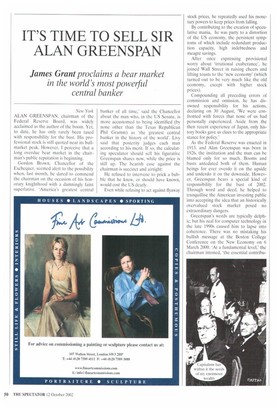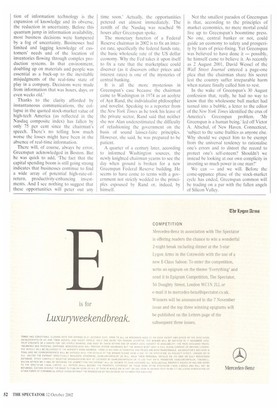IT'S TIME TO SELL SIR ALAN GREENSPAN
James Grant proclaims a bear market in the world's most powerful central banker
New York ALAN GREENSPAN, chairman of the Federal Reserve Board, was widely acclaimed as the author of the boom. Yet, to date, he has only rarely been taxed with responsibility for the bust. His professional stock is still quoted near its bullmarket peak. However, I perceive that a long overdue bear market in the chairman's public reputation is beginning.
Gordon Brown, Chancellor of the Exchequer, seemed alert to the possibility when, last month, he dared to commend the chairman on the occasion of his honorary knighthood with a damningly faint superlative. 'America's greatest central
banker of all time,' said the Chancellor about the man who, in the US Senate, is more accustomed to being identified (by none other than the Texas Republican Phil Gramm) as 'the greatest central banker in the history of the world'. Livy said that posterity judges each man according to his merit. If so, the calculating speculator should sell his figurative Greenspan shares now, while the price is still up. The bearish case against the chairman is succinct and airtight: He refused to intervene to prick a bubble that he knew, or should have known, would cost the US dearly.
Even while refusing to act against flyaway
stock prices, he repeatedly used his monetary powers to keep prices from falling.
By contributing to the creation of speculative mania, he was party to a distortion of the US economy, the persistent symptoms of which include redundant production capacity, high indebtedness and meagre savings.
After once expressing provisional worry about 'irrational exuberance', he joined Wall Street in raising cheers and lifting toasts to the 'new economy' (which turned out to be very much like the old economy, except with higher stock prices).
Compounding all preceding errors of commission and omission, he has disowned responsibility for his actions, declaring on 30 August, 'We were confronted with forces that none of us had personally experienced. Aside from the then recent experience of Japan, only history books gave us clues to the appropriate stance for policy.'
As the Federal Reserve was enacted in 1913, and Alan Greenspan was born in 1926, the institution and the man can be blamed only for so much. Booms and busts antedated both of them. Human beings for ever overdo it on the upside and underdo it on the downside. However, Greenspan bears a special kind of responsibility for the bust of 2002. Through word and deed, he helped to tranquillise the American investing public into accepting the idea that an historically overvalued stock market posed no extraordinary dangers.
Greenspan's words are typically delphic, but his zeal for computer technology in the late 1990s caused him to lapse into coherence. There was no mistaking his bullish message at the Boston College Conference on the New Economy on 6 March 2000. 'At a fundamental level,' the chairman intoned, 'the essential contribu tion of information technology is the expansion of knowledge and its obverse, the reduction in uncertainty. Before this quantum jump in information availability, most business decisions were hampered by a fog of uncertainty. Businesses had limited and lagging knowledge of customers' needs and of the location of inventories flowing through complex production systems. In that environment, doubling up on materials and people was essential as a back-up to the inevitable misjudgments of the real-time state of play in a company. Decisions were made from information that was hours, days, or even weeks old.'
Thanks to the clarity afforded by instantaneous communications, the collapse in the quoted stock-market value of high-tech America (as reflected in the Nasdaq composite index) has fallen by only 75 per cent since the chairman's speech. There's no telling how much worse the losses might have been in the absence of real-time information.
There will, of course, always be error, Greenspan acknowledged in Boston. But he was quick to add, 'The fact that the capital spending boom is still going strong indicates that businesses continue to find a wide array of potential high-rate-ofreturn, productivity-enhancing investments. And I see nothing to suggest that these opportunities will peter out any time soon.' Actually, the opportunities petered out almost immediately. The zenith of the Nasdaq was reached 96 hours after Greenspan spoke.
The monetary function of a Federal Reserve chairman in 2002 is to fix an interest rate, specifically the federal funds rate, the basic wholesale rate of the US dollar economy. Why the Fed takes it upon itself to fix a rate that the marketplace could discover (as it discovers other prices and interest rates) is one of the mysteries of central banking.
It is all the more mysterious in Greenspan's case because the chairman came to Washington in 1974 as an acolyte of Ayn Rand, the individualist philosopher and novelist. Speaking to a reporter from the New York Times as he took his leave of the private sector. Rand said that neither she nor Alan underestimated the difficulty of refashioning the government on the basis of sound laissez-faire principles. However, she said. he was prepared to be patient.
A quarter of a century later, according to informed Washington sources, the newly knighted chairman yearns to see the day when ground is broken for a new Greenspan Federal Reserve building. He seems to have come to terms with a government not strictly wedded to the principles espoused by Rand or, indeed, by himself. Not the smallest paradox of Greenspan is that, according to the principles of market economics, no mere mortal could live up to Greenspan's boomtime press. No one, central banker or not, could guide an economy to safety and prosperity by feats of price-fixing. Yet Greenspan was believed to have done it — possibly, he himself came to believe it. As recently as 2 August 2001, David Wessel of the Wall Street Journal entered a page-one plea that the chairman share his secret lest the country suffer irreparable harm when nature finally called him to rest.
In the wake of Greenspan's 30 August confession that, really, he had no way to know that the wholesome bull market had turned into a bubble, a letter to the editor of the New York Times identified the crux of America's Greenspan problem. 'Mr Greenspan is a human being,' led off Victor A. Altschul, of New Haven, Connecticut, 'subject to the same frailties as anyone else. Why should we expect him to be exempt from the universal tendency to rationalise one's errors and to distort the record to protect one's self-esteem? Shouldn't we instead be looking at our own complicity in investing so much power in one man?'
We can — and we will. Before the come-uppance phase of the stock-market cycle has ended, Greenspan common will be trading on a par with the fallen angels of Silicon Valley.



































































































 Previous page
Previous page